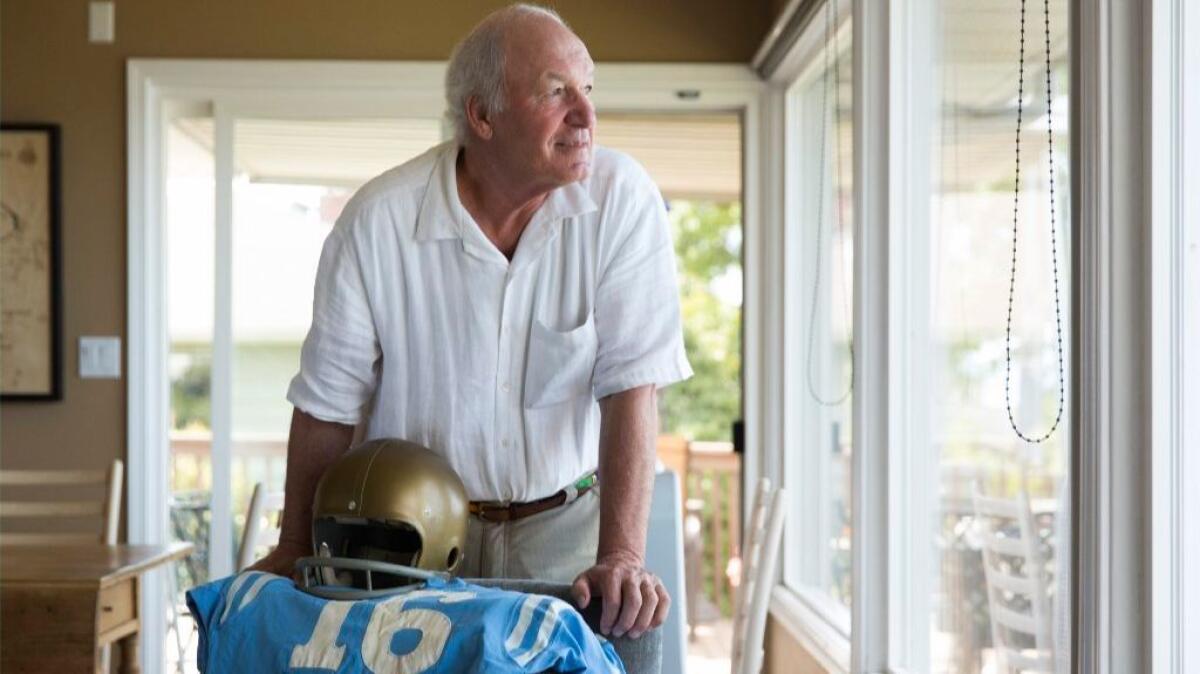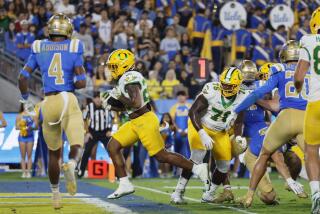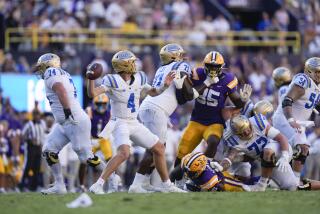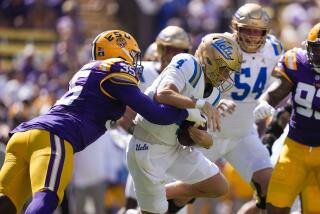Gary Beban is in a class by himself: The only UCLA player to win the Heisman Trophy

Visitors to Gary Beban’s home never knew where they might find his Heisman Trophy, only that it would never be prominently displayed or featured behind glass. Once it did humble duty as a doorstop in his study. On other occasions, he would use it as a clothes hanger when perched on his desk or his shelf.
The last few years, the trophy has been nestled among other family mementos in his son Paul’s bedroom. Gary wanted his son to take the trophy in part because his apartment in the Financial District of Manhattan is almost within view of Ellis Island, where their forebears first entered the country as immigrants from Italy and Croatia.
“I keep it very much like my father did,” Paul Beban said, “in a quiet, personal space.”
The only Heisman won by a UCLA player has never produced a hint of showmanship from the moment 50 years ago when Beban learned that he had edged USC’s O.J. Simpson in voting for college football’s most prestigious award.
On the day the winner was announced in November 1967, the Bruins’ senior quarterback was called into Chancellor Franklin David Murphy’s office under the pretense of discussing Beban’s travel plans for an upcoming scholar-athlete dinner in New York.
It was there that Beban was informed he would need to make an additional trip to New York. He had won the Heisman.
Beban participated in a conference call with reporters from New York before phoning his mother to tell her the news. Then there was a meeting with local media in a campus administration building.
That was the extent of the Heisman mania. There was no hourlong special on ESPN (the network didn’t exist), blather on 24-hour sports talk radio (ditto) or analysis of whether voters had made the right pick on Heismanpundit.com (decades away). The Los Angeles Times didn’t even send a reporter to the awards dinner two weeks later.
“The hype for the Heisman,” Beban, 71, said during a recent phone interview from his home in Bellingham, Wash., “was nothing like it is now.”
The protocol in those days was for only the winner to attend the Heisman ceremony. So Beban flew with his father, Frank, from Los Angeles to New York, where they stayed at the old Downtown Athletic Club. Gary remembered being struck that his room never got chilly even when the window was opened, exposing its occupants to the frigid outside air.
The awards dinner marked the first time in his life that Frank Beban, a longshoreman from San Francisco, had worn a tuxedo, after having been married in his Navy uniform. The crowd inside the Downtown Athletic Club was so large that the ceremony had to be shown to some attendees on closed-circuit television. But there was no live broadcast to the nation.
Beban’s passing statistics that season — 1,359 yards and eight touchdowns — might constitute a nice four-game stretch for an elite quarterback today, but his value to the Bruins was immeasurable. Sports Illustrated described him as a rollout passer who could run like an All-American halfback, and he finished the season with 11 rushing touchdowns.
The 6-foot, 180-pound quarterback strengthened the legs that would make him a dual threat while running sprints for UCLA track coach Jim Bush. An expert in 440-yard runs, Bush staged much shorter workouts for Beban after explaining that he “never saw a football player have to run 440 yards to score.”
The closest thing to a buildup for Beban’s final college season came in the UCLA media guide in the form of a quote attributed to Bruins coach Tommy Prothro: “It is inconceivable that anyone could be of more value to a football team than Gary Beban is to ours. Truly, he’s the great one.”
Asked about the “great one” nickname 50 years later, Beban suggested that it probably was not spawned by a coach who was loath to hand out compliments. “I think that came out of the PR department,” Beban said. “I don’t think that was Tommy’s idea.”
Regardless of the source’s true identity, Beban lived up to the words while leading the top-ranked Bruins to a 7-0-1 record heading into their rivalry game against USC. It was widely considered the de facto national championship because the Trojans were ranked No. 2 in the coaches’ poll and the winner would go on to the Rose Bowl.
UCLA had thrashed Washington 48-0 the previous week, but the victory came with a heavy cost. Beban had absorbed a shot to the ribs — one he felt was intentional — and they ached during the game against the Trojans whenever he twisted his body or took a hit. The pain became so acute that he was briefly forced to leave the game on a few occasions.
“At the same time, it didn’t bother me throwing,” Beban said, “so it was one of those strange ones, but it probably had some impact. It would have been nice to play without that kind of injury.”
Beban threw for a season-high 301 yards and two touchdowns with one interception that day, but UCLA kicker Zenon Andrusyshyn could not find his usually reliable form. Andrusyshyn missed a conversion kick after a touchdown and a field-goal attempt, and had two other low-flying field-goal tries blocked.
Beban mostly blamed his inability to guide the Bruins to the winning score after Simpson’s epic 64-yard touchdown run and Rikki Aldridge’s conversion kick had given USC a 21-20 lead with more than 10 minutes left. But the quarterback continued to win admirers despite the one-point defeat. Times columnist Jim Murray wrote that “if Gary Beban wins the Heisman Trophy, they ought to fill it with aspirin.”
Beban’s ribs throbbed even worse the next week during a limp loss to Syracuse. He fumbled twice, had a pass intercepted and netted eight yards before getting yanked prior to the game’s end, prompting some to wonder whether he had just lost the Heisman. Beban didn’t care about that.
“You don’t play to win trophies,” he said afterward, “you play to win games.”
Beban did both, finishing his three college seasons 23-5-2 as a starter and securing the Heisman three days after the Syracuse game. He collected 1,968 points and 369 first-place votes among the sportswriters and broadcasters who cast ballots to Simpson’s 1,722 points and 261 first-place votes.
Beban viewed it as a career achievement award given, that the Bruins had upset top-ranked Michigan State in the 1966 Rose Bowl and were ranked in the top five at some point during all three of his seasons. But it was also a consolation prize of sorts because the one triumph Beban wanted most — against USC a few weeks earlier — had slipped away.
“I don’t think anything would have been grand enough to get the taste out of our mouths of what had happened a couple of weeks before, so I was still in that state of feeling sorry for ourselves and having not won,” Beban said. “I appreciated it and I realized quickly that the three years we had played there at UCLA would not be forgotten once you are selected for that award, but that took a long time to evolve.”
Beban threw only one pass in two seasons with the Washington Redskins during a brief NFL career that preceded 47 distinguished years in global real estate services. But yearly trips to the Downtown Athletic Club for the Heisman ceremony have served as a reminder of everything Beban accomplished as a Bruin.
Beban plans to attend UCLA’s season opener against Texas A&M on Sept. 3 at the Rose Bowl as well as the Bruins’ home game against Oregon on Oct. 21, when he will be honored as part of a 50-year anniversary celebration of his winning the Heisman. The first 20,000 fans at the latter game will receive a Beban collector’s coin.
He’s forged some unlikely friendships with other Heisman winners over the years, including one with Steve Spurrier, a player Beban once envied for getting drafted by his hometown San Francisco 49ers.
“A lot of things go on at the table that people don’t see,” said Beban, who has also grown close to past winners Mike Garrett of USC and Pete Dawkins of Army.
Beban would always be willing to make room at the table for another Bruin. A few came close. Quarterbacks Troy Aikman (1988) and Cade McNown (1998) as well as halfback Paul Cameron (1953) all finished third in the Heisman voting.
“Oh, I think I would like to have some company here,” Beban said. “I’ve got time to wait.”
Follow Ben Bolch on Twitter @latbbolch
More to Read
Go beyond the scoreboard
Get the latest on L.A.'s teams in the daily Sports Report newsletter.
You may occasionally receive promotional content from the Los Angeles Times.







